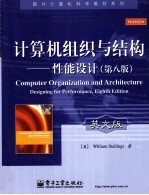图书介绍
计算机组织与结构 性能设计 英文版PDF|Epub|txt|kindle电子书版本网盘下载

- (美)William Stallings著 著
- 出版社: 北京:电子工业出版社
- ISBN:9787121170607
- 出版时间:2012
- 标注页数:774页
- 文件大小:311MB
- 文件页数:792页
- 主题词:计算机体系结构-高等学校-教材-英文
PDF下载
下载说明
计算机组织与结构 性能设计 英文版PDF格式电子书版下载
下载的文件为RAR压缩包。需要使用解压软件进行解压得到PDF格式图书。建议使用BT下载工具Free Download Manager进行下载,简称FDM(免费,没有广告,支持多平台)。本站资源全部打包为BT种子。所以需要使用专业的BT下载软件进行下载。如BitComet qBittorrent uTorrent等BT下载工具。迅雷目前由于本站不是热门资源。不推荐使用!后期资源热门了。安装了迅雷也可以迅雷进行下载!
(文件页数 要大于 标注页数,上中下等多册电子书除外)
注意:本站所有压缩包均有解压码: 点击下载压缩包解压工具
图书目录
Chapter 0 Reader’s Guide1
0.1 Outline of the Book2
0.2 A Roadmap for Readers and Instructors2
0.3 Why Study Computer Organization and Architecture3
0.4 Internet and Web Resources4
PART ONE OVERVIEW7
Chapter 1 Introduction8
1.1 Organization and Architecture9
1.2 Structure and Function10
1.3 Key Terms and Review Questions15
Chapter 2 Computer Evolution and Performance16
2.1 A Brief History of Computers17
2.2 Designing for Performance38
2.3 The Evolution of the Intel x86 Architecture44
2.4 Embedded Systems and the ARM46
2.5 Performance Assessment50
2.6 Recormnended Reading and Web Sites57
2.7 Key Terms,Review Questions,and Problems59
PART TWO THE COMPUTER SYSTEM63
Chapter 3 A Top-LevelView of Computer Function and Interconnection65
3.1 Computer Components66
3.2 Computer Function68
3.3 Interconnection Structures83
3.4 Bus Interconnection85
3.5 PCI95
3.6 Recommended Reading and Web Sites104
3.7 Key Terms,Review Questions,and Problems104
Appendix 3A Timing Diagrams108
Chapter 4 Cache Memory110
4.1 Computer Memory System Overview111
4.2 Cache Memory Principles118
4.3 Elements of Cache Design121
4.4 Pentium 4 Cache Organization140
4.5 ARM Cache Organization143
4.6 Recommended Reading145
4.7 Key Terms,Review Questions,and Problems146
Appendix 4A Performance Characteristics of Two-Level Memories151
Chapter 5 Internal Memory Technology158
5.1 Semiconductor Main Memory159
5.2 Error Correction169
5.3 Advanced DRAM Organization173
5.4 Recommended Reading and Web Sites179
5.5 Key Terms,Review Questions,and Problems180
Chapter 6 External Memory184
6.1 Magnetic Disk185
6.2 RAID194
6.3 Optical Memory203
6.4 Magnetic Tape210
6.5 Recommended Reading and Web Sites212
6.6 Key Terms,Review Questions,and Problems214
Chapter 7 Input/Output217
7.1 External Devices219
7.2 I/O Modules222
7.3 Programmed I/O224
7.4 Interrupt-Driven I/O228
7.5 Direct Memory Access236
7.6 I/O Channels and Processors242
7.7 The External Interface:Fire Wire and Infiniband244
7.8 Recommended Reading and Web Sites253
7.9 Key Terms,Review Questions,and Problems254
Chapter 8 Operating System Support259
8.1 Operating System Overview260
8.2 Scheduling271
8.3 Memory Management277
8.4 Pentium Memory Management288
8.5 ARM Memory Management293
8.6 Recommended Reading and Web Sites298
8.7 Key Terms,Review Questions,and Problems299
PART THREE THE CENTRAL PROCESSING UNIT303
Chapter 9 Computer Arithmetic305
9.1 The Arithmetic and Logic Unit (ALU)306
9.2 Integer Representation307
9.3 Integer Arithmetic312
9.4 Floating-Point Representation327
9.5 Floating-Point Arithmetic334
9.6 Recommended Reading and Web Sites342
9.7 Key Terms,Review Questions,and Problems344
Chapter 10 Instruction Sets:Characteristics and Functions348
10.1 Machine Instruction Characteristics349
10.2 Types of Operands356
10.3 Intel x86 and ARM Data Types358
10.4 Types of Operations362
10.5 Intel x86 and ARM Operation Types374
10.6 Recommended Reading384
10.7 Key Terms,Review Questions,and Problems385
Appendix 10A Stacks390
Appendix 10B Little,Big,and Bi-Endian396
Chapter 11 Instruction Sets:Addressing Modes and Formats400
11.1 Addressing401
11.2 x86 and ARM Addressing Modes408
11.3 Instruction Formats413
11.4 x86 and ARM Instruction Formats421
11.5 Assembly Language426
11.6 Recommended Reading428
11.7 Key Terms,Review Questions,and Problems428
Chapter 12 Processor Structure and Function432
12.1 Processor Organization433
12.2 Register Organization435
12.3 The Instruction Cycle440
12.4 Instruction Pipelining444
12.5 The x86 Processor Family461
12.6 The ARM Processor469
12.7 Recommended Reading475
12.8 Key Terms,Review Questions,and Problems476
Chapter 13 Reduced Instruction Set Computers (RISCs)480
13.1 Instruction Execution Characteristics482
13.2 The Use of a Large Register File487
13.3 Compiler-Based Register Optimization492
13.4 Reduced Instruction Set Architecture494
13.5 RISC Pipelining500
13.6 MIPS R4000504
13.7 SPARC511
13.8 The RISC versus CISC Controversy517
13.9 Recommended Reading518
13.10 Key Terms,Review Questions,and Problems518
Chapter 14 Instruction-Level Parallelism and Superscalar Processors522
14.1 Overview524
14.2 Design Issues528
14.3 Pentium 4538
14.4 ARM Cortex-A8544
14.5 Recommended Reading552
14.6 Key Terms,Review Questions,and Problems554
PART FOUR THE CONTROL UNIT559
Chapter 15 Control Unit Operation561
15.1 Micro-operations563
15.2 Control of the Processor569
15.3 Hardwired Implementation581
15.4 Recommended Reading584
15.5 Key Terms,Review Questions,and Problems584
Chapter 16 Microprogrammed Control586
16.1 Basic Concepts587
16.2 Microinstruction Sequencing596
16.3 Microinstruction Execution602
16.4 TI 8800614
16.5 Recommended Reading624
16.6 Key Terms,Review Questions,and Problems625
PART FIVE PARALLEL ORGANIZATION627
Chapter 17 Parallel Processing628
17.1 The Use of Multiple Processors630
17.2 Symmetric Multiprocessors632
17.3 Cache Coherence and the MESI Protocol640
17.4 Multithreading and Chip Multiprocessors646
17.5 Clusters653
17.6 Nonuniform Memory Access Computers660
17.7 Vector Computation664
17.8 Recommended Reading and Web Sites676
17.9 Key Terms,Review Questions,and Problems677
Chapter 18 Multicore Computers684
18.1 HardwarePerformance Issues685
18.2 Software Performance Issues690
18.3 Multicore Organization694
18.4 Intel x86 Multicore Organization696
18.5 ARM11 MPCore699
18.6 Recommended Reading and Web Sites704
18.7 Key Terms,Review Questions,and Problems705
Appendix A Projects for Teaching Computer Organization and Architecture707
A.1 Interactive Sinmlations708
A.2 Research Projects708
A.3 Simulation Projects710
A.4 Assembly Language Projects711
A.5 Reading/Report Assigmnents711
A.6 Writing Assigmnents712
A.7 Test Bank712
Appendix B Assembly Language and Related Topics713
B.1 Assembly Language714
B.2 Assemblers723
B.3 Loading and Linking728
B.4 Recommended Reading and Web Sites735
B.5 Key Terms,Review Questions,and Problems736
Appendix C Hash Tables740
Appendix D Victim Cache Strategies740
Appendix E Interleaved Memory740
Appendix F International Reference Alphabet740
Appendix G Virtual Memory Page Replacement Algorithms740
Appendix H Recursive Procedures740
Appendix I Additional Instruction Pipeline Topics740
Appendix J Linear Tape Open Technology740
AppendiX K DDR SDRAM740
Glossary740
References750
Index763